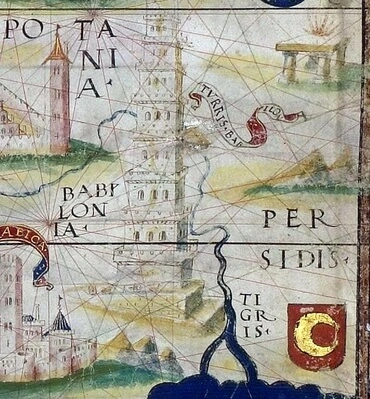1
Y FUÉ á mí palabra de Jehová, diciendo:
2
Hijo del hombre, propón una figura, y compón una parábola á la casa de Israel.
3
Y dirás: Así ha dicho el Señor Jehová: Una grande águila, de grandes alas y de largos miembros, llena de plumas de diversos colores, vino al Líbano, y tomó el cogollo del cedro:
4
Arrancó el principal de sus renuevos, y llevólo á la tierra de mercaderes, y púsolo en la ciudad de los negociantes.
5
Tomó también de la simiente de la tierra, y púsola en un campo bueno para sembrar, plantóla junto á grandes aguas, púsola como un sauce.
6
Y brotó, é hízose una vid de mucha rama, baja de estatura, que sus ramas la miraban, y sus raíces estaban debajo de ella: así que se hizo una vid, y arrojó sarmientos, y echó mugrones.
7
Y fué otra grande águila, de grandes alas y de muchas plumas; y he aquí que esta vid juntó cerca de ella sus raíces, y extendió hacia ella sus ramos, para ser regada por ella por los surcos de su plantío.
8
En un buen campo, junto á muchas aguas fué plantada, para que hiciese ramos y llevase fruto, y para que fuese vid robusta.
9
Di: Así ha dicho el Señor Jehová: ¿Será prosperada? ¿No arrancará sus raíces, y destruirá su fruto, y secaráse? Todas las hojas de su lozanía secará, y no con gran brazo, ni con mucha gente, arrancándola de sus raíces.
10
Y he aquí que plantada está ella, ¿será prosperada? ¿No se secará del todo cuando el viento solano la tocare? En los surcos de su verdor se secará.
11
Y fué á mí palabra de Jehová, diciendo:
12
Di ahora á la casa rebelde: ¿No habéis entendido qué significan estas cosas? Diles: He aquí que el rey de Babilonia vino á Jerusalem, y tomó tu rey y sus príncipes, y llevólos consigo á Babilonia.
13
Tomó también de la simiente del reino, é hizo con él alianza, y trájole á juramento; y tomó los fuertes de la tierra,
14
Para que el reino fuese abatido y no se levantase, sino que guardase su alianza y estuviese en ella.
15
Rebelóse empero contra él enviando sus embajadores á Egipto, para que le diese caballos y mucha gente. ¿Será prosperado, escapará, el que estas cosas hizo? ¿y el que rompió la alianza, podrá huir?
16
Vivo yo, dice el Señor Jehová, que morirá en medio de Babilonia, en el lugar del rey que le hizo reinar, cuyo juramento menospreció, y cuya alianza con él hecha rompió.
17
Y no con grande ejército, ni con mucha compañía hará con él Faraón en la batalla, cuando funden baluarte y edifiquen bastiones para cortar muchas vidas.
18
Pues menospreció el juramento, para invalidar el concierto cuando he aquí que había dado su mano, é hizo todas estas cosas, no escapará.
19
Por tanto, así ha dicho el Señor Jehová: Vivo yo, que el juramento mío que menospreció, y mi concierto que ha invalidado, tornaré sobre su cabeza.
20
Y extenderé sobre él mi red, y será preso en mi malla; y hacerlo he venir á Babilonia, y allí estaré á juicio con él, por su prevaricación con que contra mí se ha rebelado.
21
Y todos sus fugitivos con todos sus escuadrones caerán á cuchillo, y los que quedaren serán esparcidos á todo viento; y sabréis que yo Jehová he hablado.
22
Así ha dicho el Señor Jehová: Y tomaré yo del cogollo de aquel alto cedro, y pondrélo; del principal de sus renuevos cortaré un tallo, y plantarlo he yo sobre el monte alto y sublime;
23
En el monte alto de Israel lo plantaré, y alzará ramos, y llevará fruto, y haráse magnífico cedro; y habitarán debajo de él todas las aves, toda cosa que vuela habitará á la sombra de sus ramos.
24
Y sabrán todos los árboles del campo que yo Jehová abatí el árbol sublime, levanté el árbol bajo, hice secar el árbol verde, é hice reverdecer el árbol seco. Yo Jehová hablé é hice.







